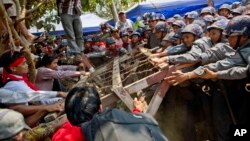Myanmar police arrested on Thursday the leader of a student movement crushed in March after he spent more than six months in hiding, a human rights monitoring group said, amid increasing signs of a crackdown on dissent ahead of a Nov. 8 election.
Kyaw Ko Ko, 34, head of the All Burma Federation of Student Unions (ABFSU), organized a march on the country's biggest city, Yangon, in February and March to protest against an education bill the students said would stifle academic freedom.
The police forcefully dispersed the students in the town of Letpadan, about 140 km (90 miles) north of Yangon, after a standoff of more than a week with security forces blocking their way to Yangon.
Kyaw Ko Ko is the latest activist caught up in a crackdown on dissent as Myanmar heads towards a historic election, when the military-backed ruling party will compete with the main opposition National League for Democracy of Nobel laureate Aung San Suu Kyi in the first free national vote in 25 years.
"Yes, that's true. Kyaw Ko Ko was arrested," Bo Kyi, an official with the Assistance Association for Political Prisoners (AAPP), told Reuters, adding he was detained in Yangon.
Bo Kyi said Kyaw Ko Ko was being held at a high-security police station in north Yangon run by the feared police Special Branch. The police station is normally used to interrogate political activists.
Police officers contacted by Reuters declined to comment. The United States and the European Union, which have backed Myanmar's move towards democracy after half a century of military rule, condemned the heavy-handed police tactics against the students in March.
Rights groups say authorities are increasingly bringing cases against students, land rights campaigners and other activists, who also complain of increased monitoring by the Special Branch.
It is a marked change from the mood when the military relinquished full power in 2011, and about 1,300 political prisoners were released as part of reforms.
In early 2014, there were just 29 political prisoners, most involved with ethnic minority insurgencies, according to the AAPP. By September, the number has risen three-fold, with 466 activists awaiting trial for political action, the watchdog group said.





